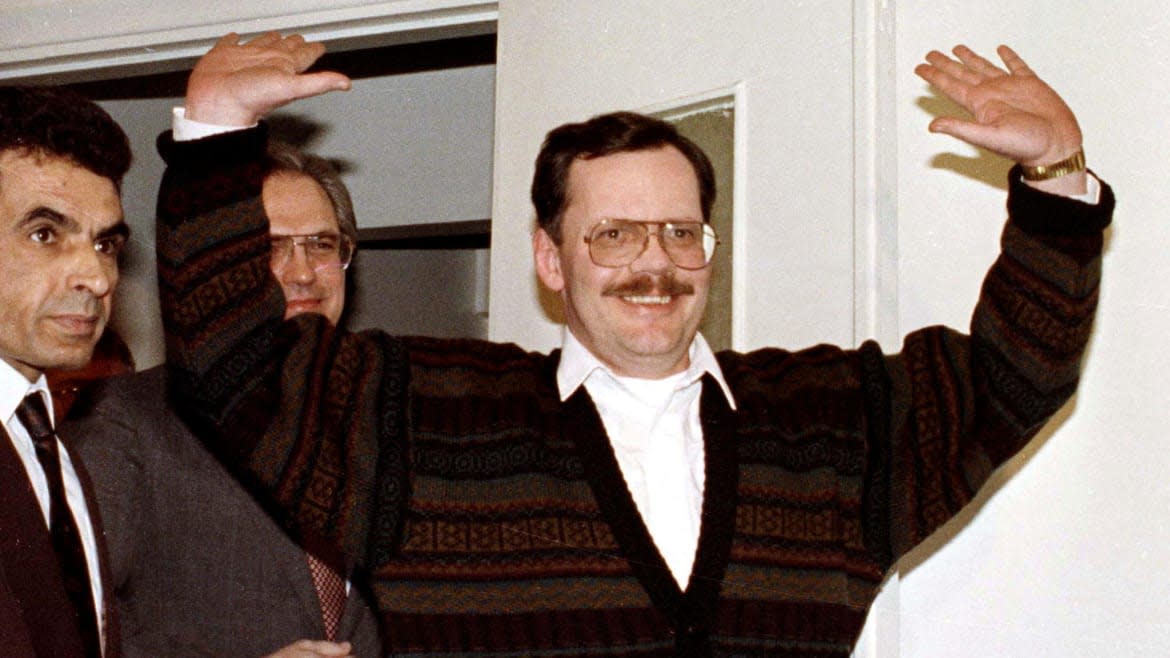Terry Anderson, AP Journalist Held Hostage for Six Years in Lebanon, Dies at 76

- Oops!Something went wrong.Please try again later.
The American journalist Terry Anderson, who was abducted by Islamic militants in 1985 and spent six years as a hostage in Lebanon, died Saturday, his daughter, Sulome Anderson, announced in a statement. He was 76.
Anderson’s cause of death was linked to complications from a recent heart surgery, Sulome said.
“Terry was deeply committed to on-the-ground eyewitness reporting and demonstrated great bravery and resolve, both in his journalism and during his years held hostage,” said Julia Pace, senior vice president and executive editor of the AP, in a statement. “We are so appreciative of the sacrifices he and his family made as the result of his work.”
Anderson was the Associated Press’ Beirut bureau chief at the time of his abduction, which came on just minutes after he’d dropped his tennis partner—a former AP photographer—at his home after an early morning tennis match on March 16, 1985.
He wrote in a book that men, armed with pistols, flung his car door open and they ripped him out, dragging him into a Mercedes-Benz that sped away—the same car he recalled cut him off the day prior.
AP Burns Headline Declaring Plagiarism a ‘Conservative Weapon’ After Harvard Prez’s Resignation
The kidnappers identified themselves as Shia Hezbollah militants of the Islamic Jihad Organization. Anderson said the men blindfolded him and kept him chained in over a dozen hideaways in and around Beirut, where he endured various beatings but was never outright tortured.
His abductors said they kidnapped him to retaliate against Israel’s use of American weapons in its strikes against targets in Lebanon, indicating it was merely the nationality of Anderson—an Ohio native—that made him a target.
Anderson was finally released in 1991, having spent a grueling 2,454 days as a hostage. He returned to the AP’s New York office a hero, famously wearing a sweatshirt that read, “Hello World” with a picture of him on it.
Once back stateside, the AP reported that he “led a peripatetic life,” traveling across the country to speak and teach journalism, but also to operate a blues bar, a Cajun restaurant, a gourmet restaurant, and even a horse ranch.
He carried out those ventures even as he publicly battled with post-traumatic stress disorder—something that was widely reported and played a factor in him being awarded millions of dollars in frozen Iranian assets after a federal court concluded it played a role in his capture.
That wealth didn’t last, however. Anderson made some bad investments and filed for bankruptcy in 2009, the AP reported, and he eventually slowed down. He retired as a professor from the University of Florida in 2015 and moved to live on a ranch in northern Virginia.
Just a week before his death, his daughter recalled that Anderson said he’d seen all he ever wanted to see in this lifetime.
“He never liked to be called a hero, but that’s what everyone persisted in calling him,” said Sulome Anderson. “I saw him a week ago and my partner asked him if he had anything on his bucket list, anything that he wanted to do. He said, ‘I’ve lived so much and I’ve done so much. I’m content.’”
Get the Daily Beast's biggest scoops and scandals delivered right to your inbox. Sign up now.
Stay informed and gain unlimited access to the Daily Beast's unmatched reporting. Subscribe now.

